-
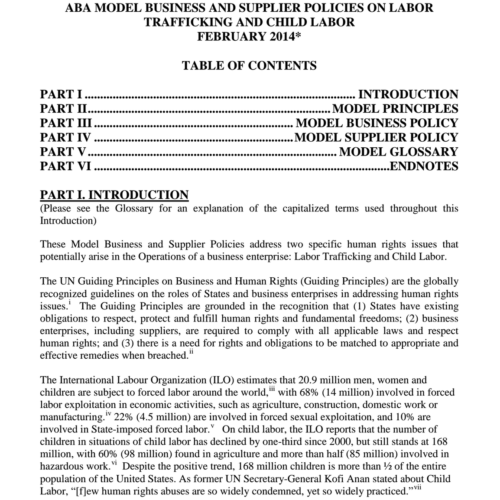 These model principles are intended for both businesses and suppliers that do not currently have policies relating to labour trafficking and child labour, and for those that do but want to adapt them to reflect evolving practices. Included are examples of model policies and principles that can be incoporated into codes of conduct or current business policies.
These model principles are intended for both businesses and suppliers that do not currently have policies relating to labour trafficking and child labour, and for those that do but want to adapt them to reflect evolving practices. Included are examples of model policies and principles that can be incoporated into codes of conduct or current business policies. -
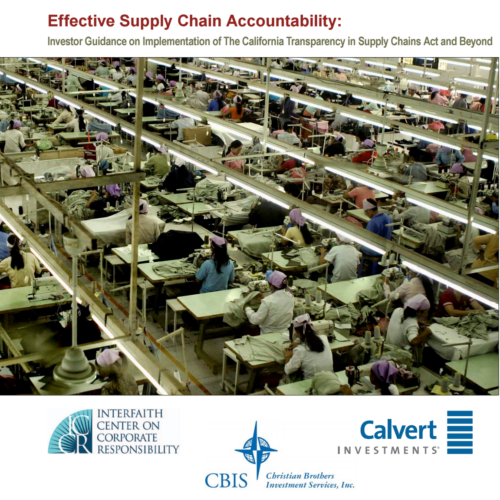 This guidance for investors outlines key steps relating to a company’s development of a specific anti-trafficking program, including elements the company should include in reports to demonstrate to stakeholders and shareholders that they are evaluating key risks in the supply chain and taking appropriate steps to address them. These include: - Develop and implement a human rights policy - Establish a human rights due diligence process - Conduct human rights risk assessments - Review, develop, and implement auditing, verification and traceability mechanisms - Train staff, suppliers, vendors, contractors, and auditors - Collaborate to expand efforts and influence - Produce a robust and substantive annual report
This guidance for investors outlines key steps relating to a company’s development of a specific anti-trafficking program, including elements the company should include in reports to demonstrate to stakeholders and shareholders that they are evaluating key risks in the supply chain and taking appropriate steps to address them. These include: - Develop and implement a human rights policy - Establish a human rights due diligence process - Conduct human rights risk assessments - Review, develop, and implement auditing, verification and traceability mechanisms - Train staff, suppliers, vendors, contractors, and auditors - Collaborate to expand efforts and influence - Produce a robust and substantive annual reportCredit: Interfaith Centre on Corporate Responsibility; Christian Brothers Investment Services; Calvert Investments.
-
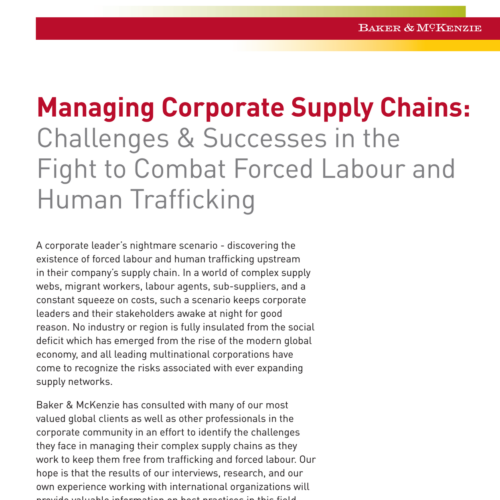 This guide is published by a law firm with expertise providing modern slavery related advice to business. It gives a good overview of the scope of the problem of trafficking in supply chains, and what existing support there is for business. It looks at the legal mechanisms already in place to protect against modern slavery in corporate supply chains, as well as the successes and challenges of corporate initiatives, and solutions to the problem.
This guide is published by a law firm with expertise providing modern slavery related advice to business. It gives a good overview of the scope of the problem of trafficking in supply chains, and what existing support there is for business. It looks at the legal mechanisms already in place to protect against modern slavery in corporate supply chains, as well as the successes and challenges of corporate initiatives, and solutions to the problem.Credit: Baker McKenzie
-
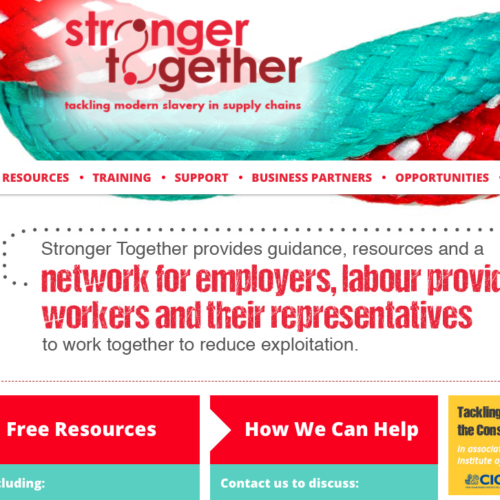 Stronger Together is a multi-stakeholder initiative which aims to reduce modern slavery. It provides guidance, training and resources to organisations, employers, labour providers, workers and their representatives. This free collection of resources includes pragmatic guidance and toolkits, and resources for the workplace including multilingual posters, leaflets and template policies.
Stronger Together is a multi-stakeholder initiative which aims to reduce modern slavery. It provides guidance, training and resources to organisations, employers, labour providers, workers and their representatives. This free collection of resources includes pragmatic guidance and toolkits, and resources for the workplace including multilingual posters, leaflets and template policies.Credit: Stronger Together
-
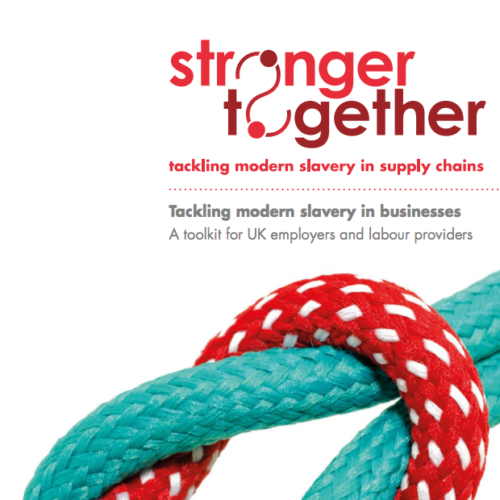 Stronger Together is a multi-stakeholder initiative which aims to reduce modern slavery. It provides guidance, training and resources to organisations, employers, labour providers, workers and their representatives. This free collection of resources includes pragmatic guidance and toolkits, and resources for the workplace including multilingual posters, leaflets and template policies.
Stronger Together is a multi-stakeholder initiative which aims to reduce modern slavery. It provides guidance, training and resources to organisations, employers, labour providers, workers and their representatives. This free collection of resources includes pragmatic guidance and toolkits, and resources for the workplace including multilingual posters, leaflets and template policies.Credit: Stronger Together
-
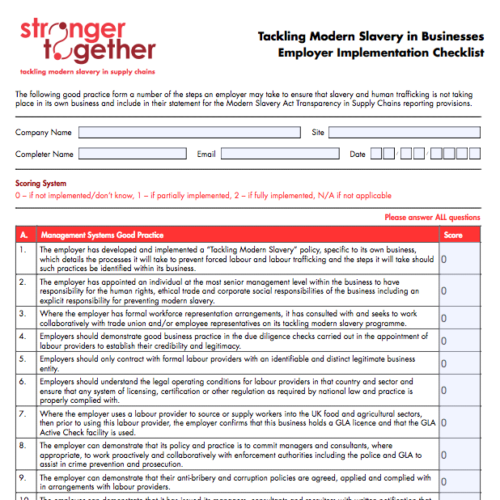 Stronger Together is a multi-stakeholder initiative which aims to reduce modern slavery. It provides guidance, training and resources to organisations, employers, labour providers, workers and their representatives. This free collection of resources includes pragmatic guidance and toolkits, and resources for the workplace including multilingual posters, leaflets and template policies. This is a good practice checklist that can be used by employers to ensure modern slavery and human trafficking is not happening in any area of their own business, and to include in their statement for the Modern Slavery Act Transparency in Supply Chains reporting provisions. It splits up the checklist into: management systems , training to build capacity and capability, labour sourcing, recruitment processes, worker records analysis to alert risks, workplace monitoring, worker engagement, providing access to remedy.
Stronger Together is a multi-stakeholder initiative which aims to reduce modern slavery. It provides guidance, training and resources to organisations, employers, labour providers, workers and their representatives. This free collection of resources includes pragmatic guidance and toolkits, and resources for the workplace including multilingual posters, leaflets and template policies. This is a good practice checklist that can be used by employers to ensure modern slavery and human trafficking is not happening in any area of their own business, and to include in their statement for the Modern Slavery Act Transparency in Supply Chains reporting provisions. It splits up the checklist into: management systems , training to build capacity and capability, labour sourcing, recruitment processes, worker records analysis to alert risks, workplace monitoring, worker engagement, providing access to remedy.Credit: Stronger Together
-
 Stronger Together is a multi-stakeholder initiative which aims to reduce modern slavery. It provides guidance, training and resources to organisations, employers, labour providers, workers and their representatives. This free collection of resources includes pragmatic guidance and toolkits, and resources for the workplace including multilingual posters, leaflets and template policies. These seven principles have been agreed upon by the supermarket businesses sponsored by Stronger Together. The list includes "common principles" for the businesses' supply chains partners to follow when completing modern slavery statements.
Stronger Together is a multi-stakeholder initiative which aims to reduce modern slavery. It provides guidance, training and resources to organisations, employers, labour providers, workers and their representatives. This free collection of resources includes pragmatic guidance and toolkits, and resources for the workplace including multilingual posters, leaflets and template policies. These seven principles have been agreed upon by the supermarket businesses sponsored by Stronger Together. The list includes "common principles" for the businesses' supply chains partners to follow when completing modern slavery statements.Credit: Stronger Together
-
 Stronger Together is a multi-stakeholder initiative which aims to reduce modern slavery. It provides guidance, training and resources to organisations, employers, labour providers, workers and their representatives. This free collection of resources includes pragmatic guidance and toolkits, and resources for the workplace including multilingual posters, leaflets and template policies. This 12 point checklist lists actions for both employers and labour providers such as corporate policy improvement, workplace awareness-raising initiatives and steps to ensure supply chain transparency.
Stronger Together is a multi-stakeholder initiative which aims to reduce modern slavery. It provides guidance, training and resources to organisations, employers, labour providers, workers and their representatives. This free collection of resources includes pragmatic guidance and toolkits, and resources for the workplace including multilingual posters, leaflets and template policies. This 12 point checklist lists actions for both employers and labour providers such as corporate policy improvement, workplace awareness-raising initiatives and steps to ensure supply chain transparency.Credit: Stronger Together
-
 Stronger Together is a multi-stakeholder initiative which aims to reduce modern slavery. It provides guidance, training and resources to organisations, employers, labour providers, workers and their representatives. This free collection of resources includes pragmatic guidance and toolkits, and resources for the workplace including multilingual posters, leaflets and template policies. This toolkit gives an overview of Stronger Together's purpose, providing guidance on best practice for UK employers and labour providers on uncovering, preventing and reporting potential cases of modern slavery within their own business and supply chains. It defines modern slavery and forced labour in supply chains and third party agencies, and gives information on the processes of reporting modern slavery and supporting potential victims. It includes templates for policies and procedures, which can be found separately on this resource hub.
Stronger Together is a multi-stakeholder initiative which aims to reduce modern slavery. It provides guidance, training and resources to organisations, employers, labour providers, workers and their representatives. This free collection of resources includes pragmatic guidance and toolkits, and resources for the workplace including multilingual posters, leaflets and template policies. This toolkit gives an overview of Stronger Together's purpose, providing guidance on best practice for UK employers and labour providers on uncovering, preventing and reporting potential cases of modern slavery within their own business and supply chains. It defines modern slavery and forced labour in supply chains and third party agencies, and gives information on the processes of reporting modern slavery and supporting potential victims. It includes templates for policies and procedures, which can be found separately on this resource hub.Credit: Stronger Together
-
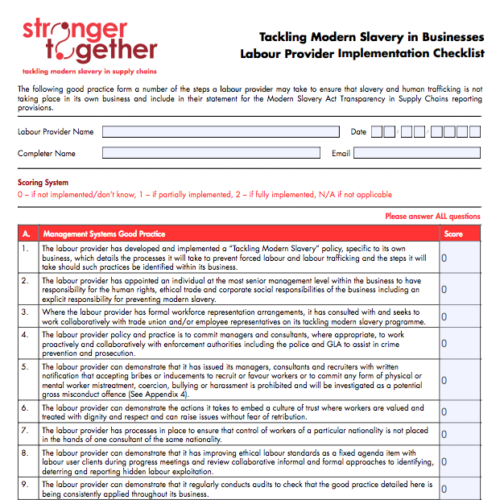 Stronger Together is a multi-stakeholder initiative which aims to reduce modern slavery. It provides guidance, training and resources to organisations, employers, labour providers, workers and their representatives. This free collection of resources includes pragmatic guidance and toolkits, and resources for the workplace including multilingual posters, leaflets and template policies. This is a good practice checklist that can be used by labour providers to ensure modern slavery and human trafficking is not happening in any area of their own business, and to include in their statement for the Modern Slavery Act Transparency in Supply Chains reporting provisions. It splits up the checklist into: management systems, training to build capacity and capability, labour sourcing, recruitment processes, worker records analysis to alert risks, worker allocation, workplace monitoring, worker engagement, providing access to remedy.
Stronger Together is a multi-stakeholder initiative which aims to reduce modern slavery. It provides guidance, training and resources to organisations, employers, labour providers, workers and their representatives. This free collection of resources includes pragmatic guidance and toolkits, and resources for the workplace including multilingual posters, leaflets and template policies. This is a good practice checklist that can be used by labour providers to ensure modern slavery and human trafficking is not happening in any area of their own business, and to include in their statement for the Modern Slavery Act Transparency in Supply Chains reporting provisions. It splits up the checklist into: management systems, training to build capacity and capability, labour sourcing, recruitment processes, worker records analysis to alert risks, worker allocation, workplace monitoring, worker engagement, providing access to remedy.Credit: Stronger Together
-
 Stronger Together is a multi-stakeholder initiative which aims to reduce modern slavery. It provides guidance, training and resources to organisations, employers, labour providers, workers and their representatives. This free collection of resources includes pragmatic guidance and toolkits, and resources for the workplace including multilingual posters, leaflets and template policies. This template is to be modified as required and for inclusion with a wider Tackling Modern Slavery in Business and Supply Chain or Business Human Rights Policy.
Stronger Together is a multi-stakeholder initiative which aims to reduce modern slavery. It provides guidance, training and resources to organisations, employers, labour providers, workers and their representatives. This free collection of resources includes pragmatic guidance and toolkits, and resources for the workplace including multilingual posters, leaflets and template policies. This template is to be modified as required and for inclusion with a wider Tackling Modern Slavery in Business and Supply Chain or Business Human Rights Policy.Credit: Stronger Together
-
 Stronger Together is a multi-stakeholder initiative which aims to reduce modern slavery. It provides guidance, training and resources to organisations, employers, labour providers, workers and their representatives. This free collection of resources includes pragmatic guidance and toolkits, and resources for the workplace including multilingual posters, leaflets and template policies. This template is to be modified as required and for inclusion with a wider Tackling Modern Slavery in Business and Supply Chain or Business Human Rights Policy.
Stronger Together is a multi-stakeholder initiative which aims to reduce modern slavery. It provides guidance, training and resources to organisations, employers, labour providers, workers and their representatives. This free collection of resources includes pragmatic guidance and toolkits, and resources for the workplace including multilingual posters, leaflets and template policies. This template is to be modified as required and for inclusion with a wider Tackling Modern Slavery in Business and Supply Chain or Business Human Rights Policy.Credit: Stronger Together
-
 Stronger Together is a multi-stakeholder initiative which aims to reduce modern slavery. It provides guidance, training and resources to organisations, employers, labour providers, workers and their representatives. This free collection of resources includes pragmatic guidance and toolkits, and resources for the workplace including multilingual posters, leaflets and template policies. This template is to be modified as required and for inclusion with a wider Tackling Modern Slavery in Business and Supply Chain or Business Human Rights Policy.
Stronger Together is a multi-stakeholder initiative which aims to reduce modern slavery. It provides guidance, training and resources to organisations, employers, labour providers, workers and their representatives. This free collection of resources includes pragmatic guidance and toolkits, and resources for the workplace including multilingual posters, leaflets and template policies. This template is to be modified as required and for inclusion with a wider Tackling Modern Slavery in Business and Supply Chain or Business Human Rights Policy.Credit: Stronger Together
-
 Stronger Together is a multi-stakeholder initiative which aims to reduce modern slavery. It provides guidance, training and resources to organisations, employers, labour providers, workers and their representatives. This free collection of resources includes pragmatic guidance and toolkits, and resources for the workplace including multilingual posters, leaflets and template policies. This template is to be modified as required and for inclusion with a wider Tackling Modern Slavery in Business and Supply Chain or Business Human Rights Policy.
Stronger Together is a multi-stakeholder initiative which aims to reduce modern slavery. It provides guidance, training and resources to organisations, employers, labour providers, workers and their representatives. This free collection of resources includes pragmatic guidance and toolkits, and resources for the workplace including multilingual posters, leaflets and template policies. This template is to be modified as required and for inclusion with a wider Tackling Modern Slavery in Business and Supply Chain or Business Human Rights Policy.Credit: Stronger Together
-
 Stronger Together is a multi-stakeholder initiative which aims to reduce modern slavery. It provides guidance, training and resources to organisations, employers, labour providers, workers and their representatives. This free collection of resources includes pragmatic guidance and toolkits, and resources for the workplace including multilingual posters, leaflets and template policies. This template is to be modified as required and for inclusion with a wider Tackling Modern Slavery in Business and Supply Chain or Business Human Rights Policy.
Stronger Together is a multi-stakeholder initiative which aims to reduce modern slavery. It provides guidance, training and resources to organisations, employers, labour providers, workers and their representatives. This free collection of resources includes pragmatic guidance and toolkits, and resources for the workplace including multilingual posters, leaflets and template policies. This template is to be modified as required and for inclusion with a wider Tackling Modern Slavery in Business and Supply Chain or Business Human Rights Policy.Credit: Stronger Together
-
 Stronger Together is a multi-stakeholder initiative which aims to reduce modern slavery. It provides guidance, training and resources to organisations, employers, labour providers, workers and their representatives. This free collection of resources includes pragmatic guidance and toolkits, and resources for the workplace including multilingual posters, leaflets and template policies. This toolkit provides guidance and good practice for responsible businesses to develop a robust strategy to prevent, uncover, and report modern slavery, particularly forced labour and human trafficking, which may be occurring within their supply chains. It is intended primarily for staff working within a CSR capacity but can also be used by staff working in social compliance, procurement HR and risk management.
Stronger Together is a multi-stakeholder initiative which aims to reduce modern slavery. It provides guidance, training and resources to organisations, employers, labour providers, workers and their representatives. This free collection of resources includes pragmatic guidance and toolkits, and resources for the workplace including multilingual posters, leaflets and template policies. This toolkit provides guidance and good practice for responsible businesses to develop a robust strategy to prevent, uncover, and report modern slavery, particularly forced labour and human trafficking, which may be occurring within their supply chains. It is intended primarily for staff working within a CSR capacity but can also be used by staff working in social compliance, procurement HR and risk management.Credit: Stronger Together

